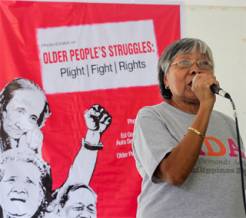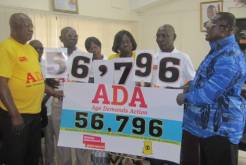 By Sarah Marzouk
By Sarah Marzouk
The third session of the UN Open-ended Working Group on Ageing (OEWG) takes place in New York between 21-24 August. The OEWG provides a unique opportunity for UN Member States to look at how existing human rights mechanisms protect older people’s rights and, if found to be inadequate, explore creating new mechanisms.
This third OEWG session will discuss gaps in the protection of older people’s rights and how to address them in a number of areas, including, violence and abuse, age discrimination, autonomy, independent living and healthcare, social security and access to resources, as well as access to justice.
Discussing older people’s rights with governments and civil society
HelpAge staff and partners will be actively participating in the OEWG, including:
- talking to government delegations, especially those that our partners, Affiliates and Age Demands Action activists have met over the last few months, about how important it is that the OEWG continue
- making a number of statements on the need to strengthen the protection of older people’s rights by developing dedicated human rights instruments, for example a convention on older people’s and a special rapporteur on older people’s rights
- joining forces with other civil society organisations to call for action and make this case
- inputting evidence into discussions through two papers – one on the gaps in the protection of older people’s rights and the other on the different options available to fill those gaps.
Older people failed by existing human rights framework
Based on our research and work with older people, we believe that the existing human rights framework has completely failed older people and urgently needs to be improved.
The current protection gap is a result of the failure to define and provide for circumstances and institutions that deprive older people of their dignity in international human rights law.
Bridget Sleap, HelpAge’s Senior Rights Policy Adviser commented: “Population ageing is one of most significant global trends of 21st century. That a large and growing sector of society experiences such vulnerability to human rights violations and is not adequately protected in the international human rights system is unacceptable and undermines the universality of human rights.
“Assessing the different human rights instruments available, we believe the most effective way to address this protection gap is by articulating how human rights apply in old age and to older people in legally binding standards dedicated to the rights of older people.”
Calling governments to attend the OEWG
However, not all Member States agree and previous OEWG sessions have suffered from disappointing participation by African and Asian governments. Civil society, therefore, has a critical role to play in making sure the OEWG results in positive action.
Through our Age Demands Action for Rights campaign and other meetings with government officials, our Affiliates and partners have been alerting their governments to the urgency of this third session and encouraging them to participate.
Their efforts resulted in firm commitments from the governments of Ghana, Indonesia (representing ASEAN states) and Tanzania that they will send representatives to the OEWG.
Campaigners to present petition on a convention on older people’s rights
 Age Demands Action (ADA) campaigners have also had huge success in collecting tens of thousands of signatures for our ADA petition which calls for a convention on older people’s rights.
Age Demands Action (ADA) campaigners have also had huge success in collecting tens of thousands of signatures for our ADA petition which calls for a convention on older people’s rights.
In New York, an older ADA campaigner from Kyrgyzstan, Kulumkan Shabdanbekova, will present over 55,000 ADA petition signatures from 118 countries to Ivan Šimonović, the UN Assistant Secretary-General for Human Rights and head of the Office of the High Commissioner for Human Rights in New York.
Our Affiliates in the Philippines, Ghana, Indonesia and Nepal have already started handing over their petition signatures in support of a convention to high level officials in their countries.
Finally, we have written a call for action which includes ten reasons why the Working Group should recommend the strengthening of legally-binding standards on the rights of older people, which has been endorsed by a broad and diverse range of nearly 100 civil society organisations.
